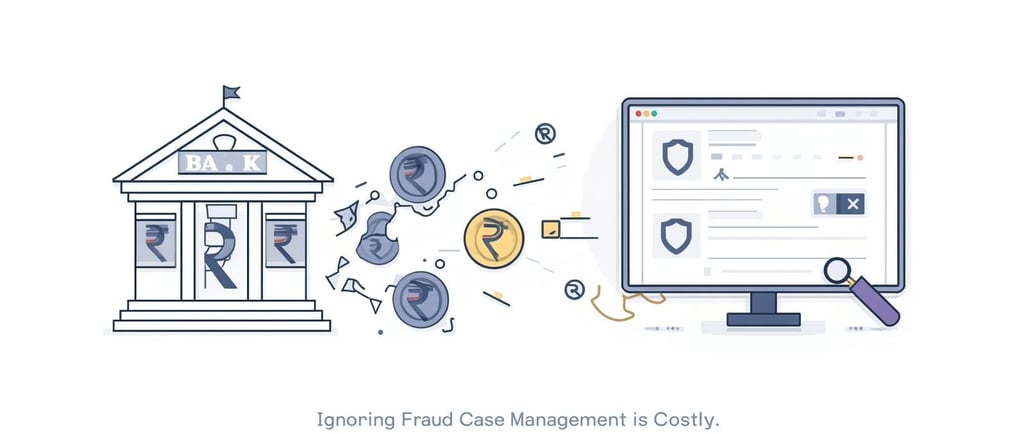The Cost of Ignoring Structured Fraud Case Management: Lessons from Indian BFSI Sector
Mr. APK Chettiar, Director, Digital Business Technology Pvt. Ltd.
9/17/20253 min read


Fraud in India's BFSI sector is a persistent threat, costing billions and eroding trust. In 2023-24, RBI reported 13,000 fraud cases with losses over INR 30,000 crore, yet many banks still overlook structured fraud management despite regulatory advancements. This article examines the consequences of this oversight and draws lessons from real-world incidents to underscore the need for robust systems.
The High Price of Inaction
Fraud in the BFSI sector--ranging from loan frauds and identity theft to cybercrimes--can devastate financial institutions, especially when structured fraud case management is ignored. Ignoring structured fraud case management amplifies these risks in several ways:
1. Financial Losses: Unmanaged fraud cases lead to direct monetary losses. For example, the 2018 Punjab National Bank (PNB) fraud involving Nirav Modi resulted in losses of over INR 14,000 crore, largely due to inadequate monitoring and delayed detection. Without structured processes, institutions struggle to identify and contain fraud early, which escalates losses.
2. Reputational Damage: Fraud incidents tarnish an institution’s reputation, eroding customer and investor confidence. The 2020 Yes Bank crisis, triggered partly by governance lapses and fraudulent loan practices, led to a sharp decline in share value and customer trust. A structured approach to fraud case management, with clear reporting and resolution protocols, could mitigate such fallout.
3. Regulatory Penalties: RBI’s 2024 Master Directions require timely fraud reporting. Non-compliance leads to penalties and scrutiny, highlighting the regulatory cost of disorganized case management.
4. Operational Disruptions: Ad-hoc fraud management strains resources, diverting attention from core operations. In 2022, a mid-sized cooperative bank struggled with operational inefficiencies after a cyber-fraud incident, as it lacked a centralized system to track and resolve cases.
Lessons from Indian BFSI Incidents
Recent fraud cases in India’s BFSI sector offer critical lessons:
- PNB-Nirav Modi Case (2018): Fraudulent Letters of Undertaking went undetected for years due to weak internal controls and lack of integrated EWS, which a structured case management system could have flagged early.
- The IL&FS Crisis exposed fraudulent practices and governance failures, which a dedicated fraud oversight committee could have prevented.
- DHFL Fraud (2021) highlighted the need for legal audits of high-value loans. Structured case management, including mandatory audits and borrower due diligence, could have mitigated risks.
These cases underscore that reactive, fragmented approaches to fraud management, as evidenced by the discussed incidents, are inadequate in today’s complex financial landscape.
Building a Structured Fraud Case Management Framework
Building on the lessons learned from past incidents, to avoid the pitfalls of ignoring structured fraud case management, BFSI institutions must adopt a proactive, systematic approach aligned with RBI guidelines:
1. Centralized Case Management Systems: Implement platforms to track, investigate, and resolve fraud cases. These systems should integrate with core banking platforms and EWS to enable real-time monitoring and reporting.
2. Establish Board Committees for Fraud Monitoring (SCBMF) or Expert Committees (CoE) as per RBI. They ensure accountability and quick decisions.
3. Leverage Technology: Use AI and machine learning to detect anomalies and predict fraud risks. For instance, banks like HDFC have adopted AI-driven tools to flag suspicious transactions, reducing fraud incidents by 15% annually.
4. Adhere to Natural Justice: Follow the Supreme Court's ruling (*State Bank of India v. Rajesh Agarwal*) by issuing show-cause notices and allowing 21 days for borrower responses before classifying accounts as fraudulent. This ensures fairness and regulatory compliance.
5. Employee Training and Awareness: Regular training on fraud typologies, red flags, and reporting protocols strengthens the first line of defence. Encouraging whistleblowing through confidential channels further enhances vigilance.
The Way Forward
Ignoring structured fraud case management is a costly oversight that Indian BFSI institutions can ill afford. Fraud's financial, reputational, and regulatory impacts underscore the need for robust systems, structured fraud case management is not just a compliance requirement – it's a strategic imperative for resilience and growth.
FraudSentinel360 offers a modern alternative, delivering centralized tracking, automated workflows, seamless integration, regulatory compliance, and robust security. As frauds grow in scale and sophistication, adopting such platforms is essential for BFSI institutions to protect assets, ensure compliance, and maintain stakeholder trust.
Sources:
- RBI Annual Report, FY 2023-24
- Master Directions on Fraud Risk Management (2024), Reserve Bank of India
- State Bank of India v. Rajesh Agarwal (2023), Supreme Court of India
- EY India, Fraud Risk Management in BFSI (2024)
Post Author
Mr. APK Chettiar
Director
Digital Business Technology Pvt. Ltd.
FraudSentinel360 – A Product by Digital Business Technology Pvt. Ltd.
FraudSentinel360 – A Product by Digital Business Technology Pvt. Ltd.
Empowering Banks, NBFCs, and Insurance Companies with AI-enabled Fraud Case Management & Regulatory Compliance. Built in line with RBI & IRDAI Guidelines | ISO 27001 Certified | GDPR Compliant
Trusted
Subscribe to OUR Newsletter
+919922113707
© 2025 Fraud Sentinel 360, All rights reserved.
